
Harry Clement Stubbs, better known by the pen name Hal Clement, was an American science fiction writer and a leader of the hard science fiction subgenre. He also painted astronomically oriented artworks under the name George Richard.
James Richard Cook was an American author of novels and stories.
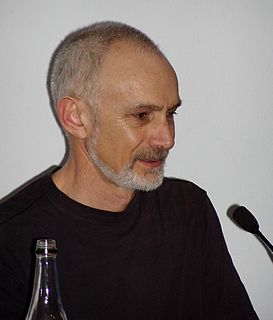
Sean Christopher McMullen is an Australian science fiction and fantasy author.
Stanley Albert Schmidt is an American science fiction author and editor. Between 1978 and 2012 he served as editor of Analog Science Fiction and Fact magazine.

Analog's Children of the Future is the third in a series of anthologies of science fiction stories drawn from Analog magazine and edited by then-current Analog editor Stanley Schmidt. It was first published in paperback by Davis Publications and hardcover by The Dial Press in December 1982.
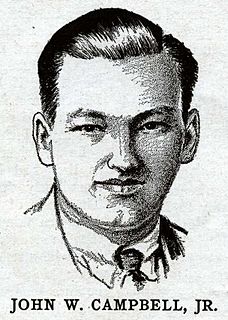
This is a bibliography of works by American writer John W. Campbell Jr.

Analog Science Fiction and Fact is an American science fiction magazine published under various titles since 1930. Originally titled Astounding Stories of Super-Science, the first issue was dated January 1930, published by William Clayton, and edited by Harry Bates. Clayton went bankrupt in 1933 and the magazine was sold to Street & Smith. The new editor was F. Orlin Tremaine, who soon made Astounding the leading magazine in the nascent pulp science fiction field, publishing well-regarded stories such as Jack Williamson's Legion of Space and John W. Campbell's "Twilight". At the end of 1937, Campbell took over editorial duties under Tremaine's supervision, and the following year Tremaine was let go, giving Campbell more independence. Over the next few years Campbell published many stories that became classics in the field, including Isaac Asimov's Foundation series, A. E. van Vogt's Slan, and several novels and stories by Robert A. Heinlein. The period beginning with Campbell's editorship is often referred to as the Golden Age of Science Fiction.
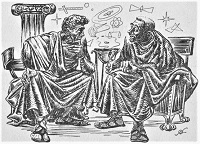
"Aristotle and the Gun" is a time travel and alternate history science fiction story by American writer L. Sprague de Camp.

Brad R. Torgersen is an American science fiction author whose short stories regularly appear in various anthologies and magazines, including Analog Science Fiction and Fact and Orson Scott Card's Intergalactic Medicine Show.
This is the complete bibliography of American space opera and hard science fiction author Catherine Asaro.

The Analog Anthology #1 is an anthology of science fiction stories and articles drawn from Analog magazine over its first fifty years of publication, edited by then-current Analog editor Stanley Schmidt. It was first published in paperback by Davis Publications in December 1980, and reprinted under the alternate title Fifty Years of the Best Science Fiction from Analog in 1982. A hardcover edition was issued under the alternate title Analog’s Golden Anniversary Anthology in 1981.
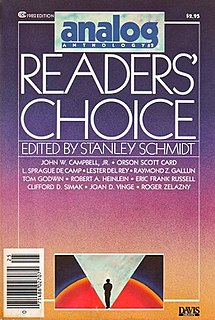
The Analog Anthology #2: Readers' Choice is an anthology of science fiction stories and articles drawn from Analog magazine, edited by then-current Analog editor Stanley Schmidt. It was first published in paperback by Davis Publications in January 1982, and reprinted later the same year under the alternate title Analog: Readers' Choice. A hardcover edition was issued by The Dial Press under the alternate title in March 1982.
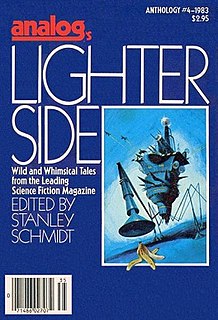
Analog's Lighter Side is the fourth in a series of anthologies of science fiction stories drawn from Analog magazine and edited by then-current Analog editor Stanley Schmidt. It was first published in paperback by Davis Publications in 1982, with a hardcover edition following from The Dial Press in January 1983.
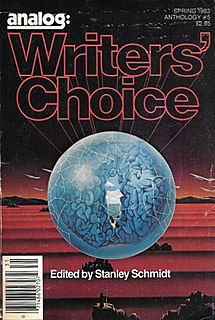
Analog: Writers' Choice is the fifth in a series of anthologies of science fiction stories drawn from Analog magazine and edited by then-current Analog editor Stanley Schmidt. It was first published in paperback by Davis Publications and hardcover by The Dial Press in 1983.
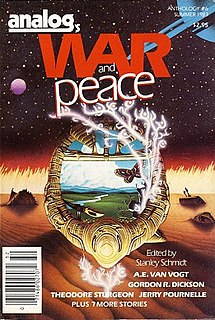
Analog's War and Peace is the sixth in a series of anthologies of science fiction stories drawn from Analog magazine and edited by then-current Analog editor Stanley Schmidt. It was first published in paperback by Davis Publications and hardcover by The Dial Press in June 1983. The hardcover edition bore the alternate title War and Peace: Possible Futures from Analog.
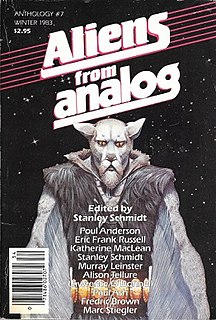
Aliens from Analog is the seventh in a series of anthologies of science fiction stories drawn from Analog magazine and edited by then-current Analog editor Stanley Schmidt. It was first published in paperback by Davis Publications and hardcover by The Dial Press in 1983.

Analog's From Mind to Mind: Tales of Communication is the ninth in a series of anthologies of science fiction stories drawn from Analog magazine and edited by then-current Analog editor Stanley Schmidt. It was first published in paperback by Davis Publications in November 1984, with a hardcover edition following from The Dial Press in December 1984 under the alternate title From Mind to Mind: Tales of Communication from Analog.

Analog's Expanding Universe is the tenth in a series of anthologies of science fiction stories drawn from Analog magazine and edited by then-current Analog editor Stanley Schmidt. It was first published in hardcover by Davis Publications for Longmeadow Press in 1986.
Alison Tellure is an American writer of science fiction who published several pieces of short fiction in the 1970s and 80s.
Arlan Keith Andrews, Sr. is an American engineer and writer of science fiction and non-fiction. He attended New Mexico State University, where he earned bachelor, master, and doctorate degrees in mechanical engineering. Since 1971, he has published three novels, three collections, over 30 non-fiction articles, almost 70 short fiction works, and multiple poems.
This page is based on this
Wikipedia article Text is available under the
CC BY-SA 4.0 license; additional terms may apply.
Images, videos and audio are available under their respective licenses.















